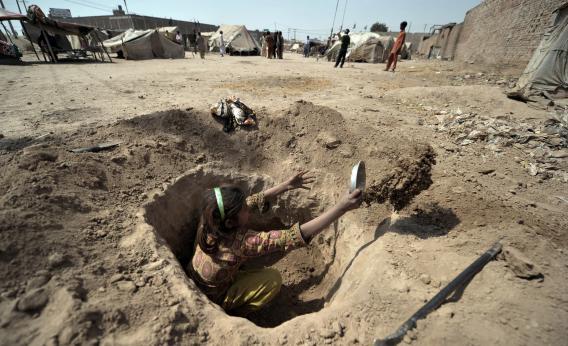A new study in Environmental Science & Technology estimates six out of 10 people on planet Earth don’t have access to flush toilets or adequate water-related sanitation. In other words, 4.2 billion human beings desperately need a technology you use every day and couldn’t give less of a shit about.
Think about it. In your bathroom, you basically have a bucket full of water that can empty and refill itself. You only use it for one purpose—waste disposal—and yet it likely smells better than your garbage can or kitchen sink.
And that water? It’s magic. You can sit there and pour cup after cup of water (or, you know, whatever) and the water level will remain almost exactly the same. But if you dump a few gallons in at once, the siphon initiates and the whole mess disappears completely. You don’t even need electricity or gas to operate the underappreciated flush toilet.
Mainly, toilets dispose of urine and feces without us ever laying a finger on either. I know, this seems a silly thing to point out, but this advancement is more recent than you probably realize. As recently as the early 1900s, much of the American South was still pooping next to a favorite tree. In fact, it wasn’t until John D. Rockefeller set out to cure the “damned Southerners” of their laziness that outhouses were invented.
The cause of that malaise, which he thought was keeping Southerners from working productively, was hookworms—tiny, toothy parasitic larvae that hatch out of human feces and crawl around in search of another host’s bare feet. Researchers realized the little buggers could move about a foot a day for four days, so they prescribed outhouses with pits six feet deep. As this simple technology spread, it alleviated iron deficiency anemia, improved health, and boosted school attendance and literacy.
Which brings us back to the rest of the world—4.2 billion people without proper sanitation. Aside from hookworms, do you know what happens when humans don’t have toilets? Dysentery happens. Typhoid happens. Cholera, hepatitis A, and diarrhea happen. And real diarrhea isn’t like when your “stomach” hurts and you get to call in sick and spend the day watching Game of Thrones. In Third World countries, real diarrhea kills more people than AIDS.
Obviously, humans have been pooping under trees and into holes for a long time. (Though, some argue we no longer do it properly.) Evidence of waste removal technology may date back to about 3,000 B.C. It’s nothing brilliant—just some drains leading away from stone huts in a Neolithic settlement found in Scotland—but a little sanitation goes a long way.
This is why the Bill & Melinda Gates Foundation held the Reinventing the Toilet Challenge last year. As so much of the world is without existing technology, the foundation hopes to dramatically improve developing-world sanitation by leapfrogging old technology, similar to the way cellphones are now prevalent in places formerly without so much as a landline. The winning team, from Caltech, built a solar-powered electrochemical reactor toilet. Water and waste gets broken down into fertilizer and hydrogen, the latter of which can be stored in fuel cells as energy. Treated water is recycled for further flushing or irrigation.
Other potential solutions abound, from the U.K. town powered by their own biomethane to the use of tiger worms and black soldier fly larvae. There are even crowd-sourced solutions like Who Gives a Crap Toilet Paper.
And then there’s the good old-fashioned celebrity charity. Matt Damon’s Water.org wins the award for advocacy advertising that doesn’t suck. In fact, it’s kind of hilarious. And though his numbers don’t match up with the new doom and gloom from Environmental Science & Technology, the message is the same: It’s time we get our shit together.
